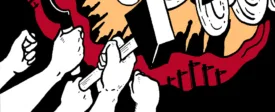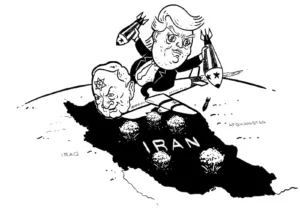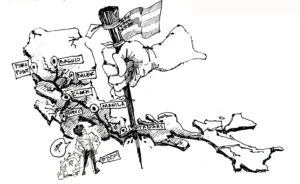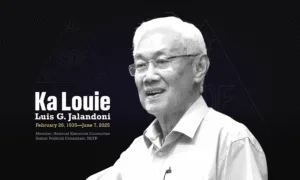On its 60th anniversary, Kabataang Makabayan rightfully deserves a salute as an outstanding revolutionary organization of Filipino youth. We must also give recognition to all the revolutionaries it has molded and contributed to advancing the national democratic revolution in both the countryside and cities over the past six decades.
Among them is Ernesto Jude Rimando Jr, known as Bogs/Talong to his friends and youth leaders, and Ka Dante to the vast masses of workers and peasants in Cebu, Bohol, and Negros. He was also Felipe Marcial, Kabataang Makabayan chairperson during the Second Great Rectification Movement (SGRM), who fought against the widespread disorientation in the student movement, opposed factionalism, and intensified the study movement and protest actions in the 1990s.
Jude spent more than two decades working in the youth-student sector. Here, he was known as a diligent and patient organizer. He impressed his Philippine Science High School teachers who thought he was a truant because he often skipped class, only to find out that he was actually organizing. He entered the University of the Philippines (UP) and studied Mechanical Engineering to continue his work. He did complete his course.
During his time at the university, his collective focused on intensifying the movement against the proposed tuition fee increase. Before long, he took on greater responsibilities in the Party committees overseeing the underground youth-student movement, up to the national level.
It was amid this task when the SGRM was launched. Although he had a hand in the conservatism and cliqueism of the youth-student movement, Jude proudly asserted that he was not swayed by the treacherous groups that then peddled “alternative politics” masquerading as a “development” of the principles of national democracy. He upheld the Party’s discipline while facing the criticisms of weaknesses that plagued the youth-student movement at the time. He led the fight against liquidationism under the leadership of the factionalists in UP Diliman.
He was among those who led the rectification movement against the forces that undermined the principle of the two-stage revolution and national democratic struggle. As KM chairperson, he facilitated analysis and policies to strengthen the ranks of the youth against the saboteurs of the movement. Under his leadership, KM chapters in the youth sector were revitalized.
He led the committee that summed-up the sector’s experiences in 1994. “This was for me a decisive attitude in rectification because the greatest contribution to rectification is to present our experiences and critically examine them,” he said.
Personally, Jude felt embarassed because of his prolonged stay in the youth-student sector. “I kept justifying that I made valid contributions,” he recalled. Eventually, he responded to the Party’s call for the deployment of proletarian cadres to other regions. Along with his first wife, he requested transfer to Central Visayas. From 1998 to 2016, Jude worked in Cebu, where he was assigned as a member of the Central Visayas regional committee’s secretariat. He closely monitored the labor movement on the island, including the massive strike of Sulpicio Shipping workers in 2002. In 2017-2019, Jude worked in Negros, where he served as a member of the Party’s executive committee on the island. He led the struggles of sugarcane farm workers, including the fight for the right to collective till the land for food.
“He wholeheartedly embraced the responsibilities given to him. He diligently researched complex issues, especially in advancing the anti-feudal struggle for land,” the National Federation of Peasants-Negros stated. “For him, sacrifice and hardship alongside the peasant masses were normal events in the life of a revolutionary.”
In January 2021, state forces illegally arrested Jude on fabricated charges while undergoing medical treatment in Metro Manila. He received much delayed medical attention and his liver cancer progressed to stage 4. His unfinished work was still on his mind even on his deathbed.
His final interview narrated the valuable lessons he learned from his decades-long struggle. He also critically assessed his contributions. “The dialectics of revolutionary life are really intense. There’s joy in progress and there’s also struggle. Joy is deepest when you’re mired in a very difficult situation and overcome it,” he said.
He said he erroneously assumed he knew it all when he began his full time activism in his youth. “Yet there’s still so much to learn. That’s why one needs to constantly study principles and policies,” he said.
“Perhaps the aspect I’ve come to know over time is that there will be many times when you think you’re trapped or have almost no option, or that contradictions can’t be resolved. But the most important thing I’ve learned is how to improve, how to be more critical of oneself. Admit one’s own weaknesses, shortcomings. Second, deep trust. Because in the most difficult situations, the real issue is whether everyone is willing to work together to surmount the most difficult problems,” he said.
Jude passed away at the age of 58 due to liver cancer and other illnesses on July 23 at the Philippine General Hospital, where he was confined since May. He died in detention, fighting eight trumped-up cases filed by the military under the contrived name “Allan Morales.” The revolutionary movement honored him and recognized his expertise, intelligence, and diligence he contributed to the revolution.
Until his last breath, Jude was a model of commitment to the revolutionary cause and the certain victory of the national democratic revolution.













